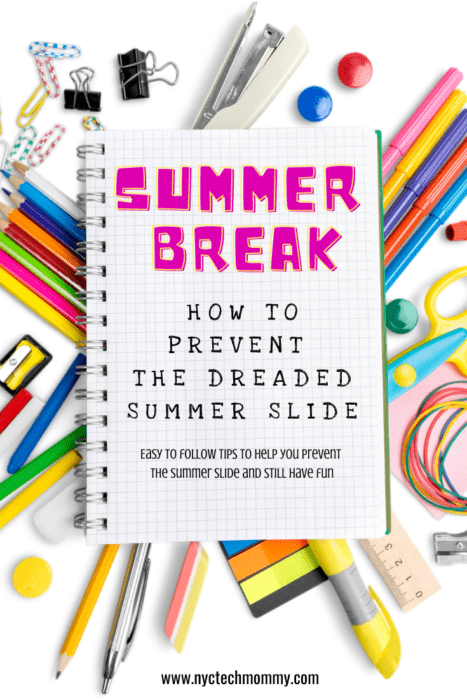
How to Prevent the Dreaded Summer Slide & Still Have Fun
Parents and children are often equally excited for the summer, and the whole host of fun they are going to have between two school years. However, research has shown that a student can on average loose one month’s worth of learning during the summer, most notably in math, and that this loss is more pronounced in higher grades. As much as six weeks can then be spent making up for that summer slide come fall. Without some regular practice, all those skills and knowledge our kids have acquired will start to fade.
This is a guest post in partnership with EdHelper.com.
Thanks to our good friends at EdHelper for sharing the following easy to follow tips to prevent the summer slide and still have fun this summer!
Read on to the end of this post for your chance to win your very own EdHelper.com membership and take advantage of all the great resources and worksheets to help your kids keep learning through summer… and beyond. Read on!
THIS GIVEAWAY HAS NOT ENDED. WINNER SELECTED AND ANNOUNCED VIA RAFFLECOPTER BELOW.

In order to prevent the dreaded summer slide, you can add as little as half an hour a day of practicing different skills to your summer routine. That way it won’t feel too much like school, but you’ll still be able to achieve your objective of preventing summer learning loss.
Let’s see how best to go about it:
Find the time for learning and prevent the summer slide
The first step in your summer learning loss prevention program is finding the time to do some schoolwork.
Think about the subjects you want to work on with your child: we highly recommend focusing on math and reading comprehension, as it is always good to work on these core subjects.
We would also recommend focusing on a subject your kids really love, as well as on a subject they are not particularly good at (so they can keep up with their class when the new school year arrives). This will provide an acceptable balance of interest and chore.
Once you have a list of subjects in mind, create a schedule around them, with 30-ish minutes or an hour a day in total. Add this time slot to your daily family schedule or calendar, so everyone knows it needs to be tackled and when. Once on the calendar, you’ll be less likely to forget or find an excuse to skip a day of learning.
Read both for school and for pleasure
Helping your children fall in love with books is incredibly important. Reading will open up a whole new world and teach them more about life than we ever could. However, when all they have to work on are books they don’t find interesting or may be interesting but feel too much like school work, you might soon be facing some resistance.

Try to approach the problem from two different angles. First, find some reading comprehension worksheets that will serve as the schoolwork part of your summer reading program. As little as 10-15 minutes a day with these workbooks can keep your child’s reading skills at the required level. EdHelper has a whole range of interesting ones you can explore and print out at your own leisure.
Also make sure you do some reading for fun as well. Let your kids choose some of the books they will read during the summer, or ask your librarian for books that will be both fun and challenging for your child’s reading level. You might even want to try some fun reading challenges and games.
RELATED: Three Easy Ways To Avoid The Summer Slide

Work on math skills
Math is without a doubt one of the least liked subjects in school, yet it is incredibly useful not only in life, but for developing your child’s cognitive abilities as well.
Practicing math during the summer may seem like a bit of a bore, but 3-4 problems a day is all you need to prevent the summer slide. Find math practice worksheets online, or ask your teacher to recommend some you can use, and make it a point to do 3 problems every day. This can be a part of your child’s daily to do list, one that they can proudly tick off their list in the mornings.
EdHelper also offers free math worksheets you can use. They are filled with interesting problems, and have been designed to keep your child’s focus and interests levels high.
Work on writing skills
Writing well is an incredibly valuable and useful skill, and one that is also often easier to practice than others.
Have your little student keep a journal during the summer. Or better yet, have every member of the family keep one, and you can compare journal entries every day at family time.
Set a specific topic for each day – anything goes, from what you would like to do on that day, to what you had for breakfast, as long as it is a topic of interest to your child. You can of course assign different topics to different kids if their skill levels differ greatly.
Encourage your child to use a thesaurus as well, to add in some more complex words, and work with them on establishing the right flow and voice in their journal.

Let them explore interests outside school
Summertime is the perfect time to let your children learn about something they are interested in that may not be covered in school, or at least not to a very high degree.
Think in terms of topics like animals, dinosaurs, aliens, space, coding, cooking, baking, and so on – anything they would like to know more about goes.
Once you have identified the topic, help your child as much as you can and as much as they need you to: provide books, TV shows and series, online resources, take them to museums or zoos if you can, and encourage their newfound interest. Or just leave them to their own devices, if that’s what they prefer.
While the time you spend exploring these subjects can certainly be classified under “learning”, you kids won’t feel like they’ve just been to school, which makes this the perfect opportunity to sharpen all kinds of skills without the added pressure of a strict learning environment.
RELATED: The Ultimate Guide to Planning a Summer of STEM Learning

Related: 9 Easy Science Experiments to Try With Kids
Don’t forget PE
While it is incredibly important to prevent the learning summer slide, you shouldn’t forget about another very important school subject – physical education.
Encourage your kids to get better at playing sports, running, jumping, climbing, and all those activities that not only make up PE, but that make life easier and more enjoyable.
Get outside as much as you reasonably can and encourage physical activity. If you are stuck indoors a lot, find a way to get some movement in – there are plenty of things you can do even in a small apartment.
Sitting is the new smoking, as we are often told, and the sooner you instill the habit of movement and regular physical activity in your kids, the better they will be able to combat stress during their entire lives.
To sum it up
While it is certainly important to prevent summer learning loss, don’t forget that your kids also need a well-deserved break from studying. Don’t turn their summer holidays into a mini school – let them have fun, enjoy themselves and recharge their batteries for the new school year, with some interesting and engaging learning activities peppered through their day.
Don’t forget to PIN this so you too can avoid the summer slide!

EdHelper Giveaway To Help You Avoid the Summer Slide
Leave me a comment letting me know why you would love to win this EdHelper membership Giveaway! Comment must be completed before other entry options are counted. This is a giveaway for (1) EdHelper.com 12 month membership (valued at $39.98). This giveaway starts May 31st at midnight EST and ends June 21st at midnight EST. Entrants must be USA residents and at least 18 years old. One winner will be randomly selected by rafflecopter.com from all qualifying entries and contacted via the email they provide. The email will come from [email protected]. The winner has 48 hours to respond or a new winner will be chosen. Good Luck!
THIS GIVEAWAY HAS NOW ENDED AND ENTRIES ARE NO LONGER BEING ACCEPTED.
a Rafflecopter giveawayAbout EdHelper
EdHelper offers worksheets and printables on a wide range of subjects, including math and science, grammar and reading comprehension, plus offers you the chance to create your own puzzles. A great resource for teachers and parents alike, and can become your trusted companion from preschool all the way to high school.
You May Also Like

5 Gadgets Helping Those With Disabilities Enjoy Their Lives
May 2, 2018
Mommy Help: Ways to Exercise When You Are Short on Time
May 1, 2019



